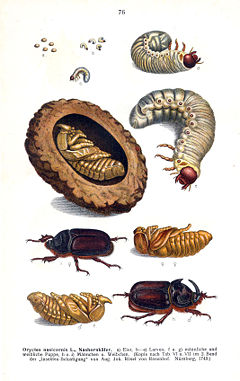
Edmund Reitter
Encyclopedia

Austria
Austria , officially the Republic of Austria , is a landlocked country of roughly 8.4 million people in Central Europe. It is bordered by the Czech Republic and Germany to the north, Slovakia and Hungary to the east, Slovenia and Italy to the south, and Switzerland and Liechtenstein to the...
entomologist , writer and a collector.
Edmund Reitter was above all well-known as an expert on the beetles of the Palaearctic.
He was an imperial advisor and editor of the "Wiener Entomologischen Zeitung" , (Vienna Entomological Gazette). In addition he was a member and honorary member of Deutsche Gesellschaft für allgemeine und angewandte Entomologie in Berlin
Berlin
Berlin is the capital city of Germany and is one of the 16 states of Germany. With a population of 3.45 million people, Berlin is Germany's largest city. It is the second most populous city proper and the seventh most populous urban area in the European Union...
, the Vereins für schlesische Insektenkunde in Breslau, the Museum Francisco-Carolinum in Linz
Linz
Linz is the third-largest city of Austria and capital of the state of Upper Austria . It is located in the north centre of Austria, approximately south of the Czech border, on both sides of the river Danube. The population of the city is , and that of the Greater Linz conurbation is about...
, the Vereins für Naturkunde (Association for Natural History) in Austria
Austria
Austria , officially the Republic of Austria , is a landlocked country of roughly 8.4 million people in Central Europe. It is bordered by the Czech Republic and Germany to the north, Slovakia and Hungary to the east, Slovenia and Italy to the south, and Switzerland and Liechtenstein to the...
, the Société entomologique de Russie in Saint Petersburg
Saint Petersburg
Saint Petersburg is a city and a federal subject of Russia located on the Neva River at the head of the Gulf of Finland on the Baltic Sea...
, the Société entomologique d'Égypte and the Nederlandsche entomologische Vereenigung in Rotterdam
Rotterdam
Rotterdam is the second-largest city in the Netherlands and one of the largest ports in the world. Starting as a dam on the Rotte river, Rotterdam has grown into a major international commercial centre...
.
As a corresponding member he worked with the Naturwissenschaftlichen Verein in Troppau, the Socíetas pro Fauna et Flora fennica in Helsinki
Helsinki
Helsinki is the capital and largest city in Finland. It is in the region of Uusimaa, located in southern Finland, on the shore of the Gulf of Finland, an arm of the Baltic Sea. The population of the city of Helsinki is , making it by far the most populous municipality in Finland. Helsinki is...
und the Réal Sociedad Espanola de Historia Natural in Madrid
Madrid
Madrid is the capital and largest city of Spain. The population of the city is roughly 3.3 million and the entire population of the Madrid metropolitan area is calculated to be 6.271 million. It is the third largest city in the European Union, after London and Berlin, and its metropolitan...
.
His beetle collection is preserved in the Natural History Museum in Budapest
Hungarian Natural History Museum
The Hungarian Natural History Museum in Budapest, dating back to 1802, houses the largest natural history collections of Hungary and the region.-Foundation:...
. It contains more than 30,000 species and 5,000 types of species
Species
In biology, a species is one of the basic units of biological classification and a taxonomic rank. A species is often defined as a group of organisms capable of interbreeding and producing fertile offspring. While in many cases this definition is adequate, more precise or differing measures are...
, subspecies, and varieties
Works
- Die Käfer des Deutschen Reiches 5 Bände, Stuttgart K. G. Lutz 1908 - 1917 (digital: Edmund Reitter: Fauna Germanica - Die Käfer des Deutschen Reiches, Digitale Bibliothek Band 134, Directmnedia Publishing GmbH, Berlin 2006. ISBN 3-89853-534-7)
Source
- Guido NonveillerGuido NonveillerGuido Nonveiller was a Croatian entomologist, FAO expert and professor at the University of Belgrade. He fought in the International Brigades and French Forces of the Interior during WW2. In 1989 he was inducted as a Commander of the l'Ordre des Palmes Académiques...
(2001). Pioneers of the Research on the Insects of Dalmatia. Croatian Natural History Museum (Zagreb) : 390 p.
External links
- Fauna Germanica - Die Käfer des Deutschen Reiches is available on line and free, at Biolib.de (Kurt Stüber's wonderful Online Library)
- Digitale Scan-Version von Fauna Germanica - Die Käfer des Deutschen Reiches, Band 1
- Digitale Scan-Version von Fauna Germanica - Die Käfer des Deutschen Reiches, Band 2
- Digitale Scan-Version von Fauna Germanica - Die Käfer des Deutschen Reiches, Band 3
- Digitale Scan-Version von Fauna Germanica - Die Käfer des Deutschen Reiches, Band 4
- Digitale Scan-Version von Fauna Germanica - Die Käfer des Deutschen Reiches, Band 5

